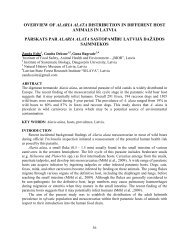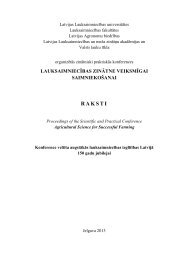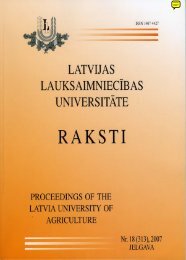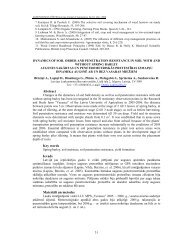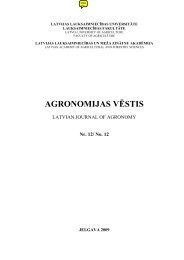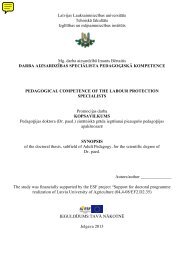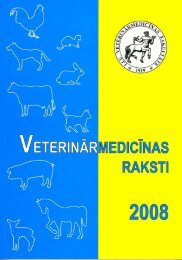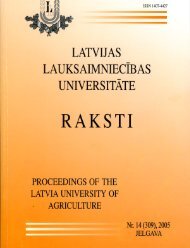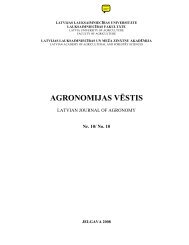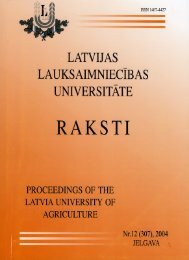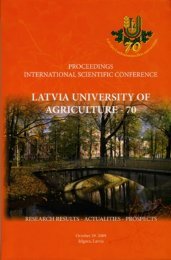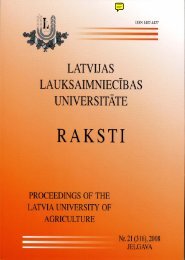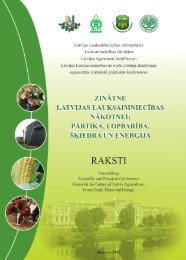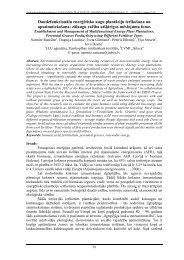Raksti II - LLU FundamentÄlÄ bibliotÄka - Latvijas LauksaimniecÄ«bas ...
Raksti II - LLU FundamentÄlÄ bibliotÄka - Latvijas LauksaimniecÄ«bas ...
Raksti II - LLU FundamentÄlÄ bibliotÄka - Latvijas LauksaimniecÄ«bas ...
Create successful ePaper yourself
Turn your PDF publications into a flip-book with our unique Google optimized e-Paper software.
SOCIĀLO ZINĀTŅU FAKULTĀTES RAKSTI <strong>II</strong>I<br />
THE ACCESSIBILITY OF INFORMATION TO TOURISTS IN<br />
FOREIGN LANGUAGES IN RIGA AND LATVIA<br />
Anda Komarovska, MBA<br />
Turiba University<br />
Graudu 68, Riga, LV-1058, Latvia; e-mail: andak@turiba.lv<br />
Abstract.<br />
The accessibility of information in foreign languages (basically English, German and Russian) promotes Riga<br />
(and Latvia) as a foreign tourist destination.<br />
The goal of the study is to determine the accessibility of Riga (and Latvia) as a tourist destination from a foreign<br />
language perspective.<br />
The tasks of the research are to conduct an empirical study of the accessibility of Riga (and Latvia) as a tourist<br />
destination from a foreign language perspective.<br />
The following methods are used: the research of theoretical literature and sources, empirical methods (an<br />
experiment, expert interviews).<br />
The result of the empirical study of Riga as a tourist destination proves that Riga and Latvia are foreign tourist<br />
unfriendly from a foreign language perspective: the amount of visual information meant for foreign visitors is<br />
insufficient, the foreign language command of employees in the sector of tourism service is rather poor. A foreign<br />
tourist must be well prepared for a visit to Latvia, previously collecting information in web pages as well as<br />
consulting the local tourist information centres and travel agencies.<br />
Key words: language, information, communication, tourist, destination, accessibility, attractions<br />
Introduction<br />
Nowadays tourism has become a popular leisure time activity, so all potential tourists<br />
try to organize it beforehand, choosing new destinations and types of leisure time activity. The<br />
tourism market is full of different offers and possibilities how to spend a vacation.<br />
Both in Europe and the world also competition in the tourism industry is becoming<br />
really severe: the market is full of a big variety of tourism products, new destinations are on<br />
offer, as well as new tourism products customized for travellers’ needs (Mārketinga stratēģija,<br />
2010) . So Latvia is forced to strengthen its position in the tourism market significantly in order<br />
to raise its competitiveness, taking into account the fact that Latvia as a tourist destination is<br />
still a weakly recognizable, and its competitiveness is rather low (Mārketinga stratēģija, 2010).<br />
However nowadays most tourists are really demanding travellers.<br />
There are various motivations why a particular destination has been selected for a<br />
journey.<br />
Research has proved that one of the leading motivations to visit a particular destination<br />
is “ease of communication” , which means the availability of comprehensible information both<br />
in the written and spoken languages to a traveller (Goeldner, 2003). The concept of “a<br />
language” is usually applied to describe verbal expressions that people use in their<br />
communication both in a spoken and written form, therefore a cross cultural communication or<br />
the exchange of information without supplying a translation in a corresponding language is<br />
unimaginable (Striphes, 2006; Sellnon et al, 2009; Barry, 1997, Starpkultūru komunikācija,<br />
2010).<br />
The translation of the necessary information into a language, comprehensible to a<br />
tourist, means a lot more than just an indication “where to go, what to do, etc.”, but also<br />
demonstrates a respectful attitude to a person who has decided to spend his/her money in the<br />
corresponding country (Striphes, 2006).<br />
There exist assumptions that one of the biggest disadvantages in the offer of Latvia’s<br />
tourism products is the language barrier, in other words,- the insufficient amount of<br />
information in a language comprehensible to tourists (Mārketinga stratēģija, 2010; Aptaujas<br />
anketa, 2010) In connection with the data, compiled by the Central Statistics Department, most<br />
14



